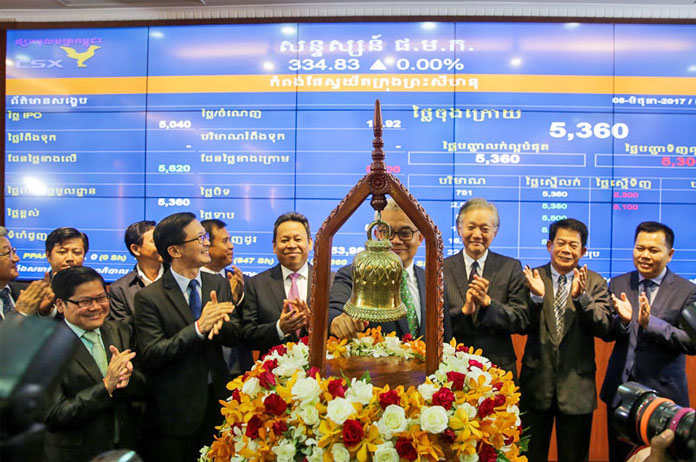Port Shares End Slightly Higher On CSX Debut

Sihanoukville Autonomous Port made its debut yesterday on the Cambodia Securities Exchange (CSX) as the fifth publicly listed company on the bourse with shares ending at 0.79 percent higher at the close of trading.
At the start of trading SAP’s shares opened at 5,360 riel ($1.34), up $0.08 from the initial public offer at $1.26 per share. The opening trading volume was 11,071 shares. However just before the CSX closed it dropped to $1.27, with 24,869 shares traded in total for the day.
SAP becomes the fifth company on the bourse joining Phnom Penh Special Economic Zone Plc., Phnom Penh Autonomous Port, Grand Twins International (Cambodia) Plc. and the Phnom Penh Water Supply Authority.
The listing comes after a fully subscribed IPO where 21.4 million shares were offered to the public at $1.26 per share. SAP managed to raise around $27 million in one of the biggest initial public offer the CSX has ever seen.
Lou Kim Chhun, SAP chairman and CEO, said the $27 million would be used to develop the infrastructure of the port. “I believe investors have confidence in SAP as our income keeps increasing year-on-year and our share value will not fall below the IPO price,” he said.
Kim Chhun also noted that national investors now controlled 35.57 percent of SAP’s paid up share capital after the IPO, while foreign investors held 64.43 percent – the largest of which was the Japan International Cooperation Agency (JICA).
According to an SAP report filed with the CSX, JICA purchased 11.5 million shares at a total of $14.5 million. “JICA purchased SAP shares because they trust our capabilities to run the port. By 2022, our port will receive over 90 percent of container shipments from the Asia-Pacific,” said Kim Chhun.
Aun Pornmoniroth, Minister of Economy and Finance, said that he was confident SAP would grow after being listed on the CSX. “JICA’s investment is a positive sign and it indicates the confidence SAP has instilled among foreign investors,” he said.
SAP’s journey to be listed on the CSX has indeed been a long one. It took five years for the IPO to get off the ground due to numerous delays.
“That it took five years for them to have an IPO just shows their resilience. They never gave up despite the initial setbacks,” said Lamun Soleil, director of the market operations department at the CSX. “The important fact is that they finally succeeded at getting listed and this shows a lot of investors – both local and overseas – have strong interests in high-growth state-owned enterprises.”